It’s unofficially racing season!
Road racing season that is.
Everyone I interact with seems to be preparing or recovering from a race.
Twitter is buzzing with nervous energy as people prepare to fight off their inner demons. One often overlooked factor for those racing the ultimate test of human spirit, AKA the marathon is how to make sure you have enough muscle glycogen to get you through without crashing hard, or as we in the running world say; bonking.
With my marathon just a few weeks away, I have been preparing my body as best I can for the race. I have used my new best friend fuelbelt to consume enough liquid on long runs, practiced taking gels while running at race pace, and worn in my footwear as best I could to build blister preventing callouses to hopefully spare my toenails.
Why do you need to practice eating and drinking while running?
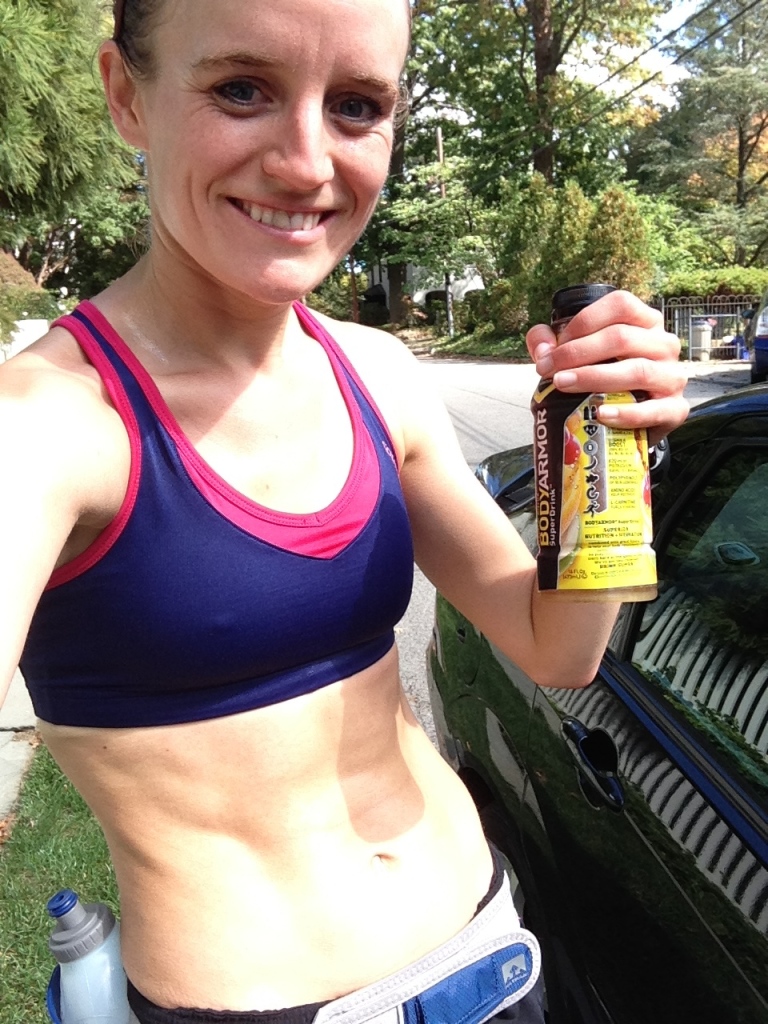 Before I began marathon training, I never practiced fueling.
Before I began marathon training, I never practiced fueling.
I had always been too stubborn to take even a single sip of liquid during a race, but a number of experienced marathoners informed me (gently) that I will never finish a marathon without swallowing my pride. I began to practice.
Thankfully, drinking was not actually as bad as I thought, neither were the gels once I got used to them.
It sparked my interest in what studies have found about fuel during extended periods.
With the increase in Ironman participation and ultra endurance events, I decided to do my own research on the current information available.
How far do you have to run to need to start eating and drinking while running?
It is well known that carbohydrate consumption before and during exercise is necessary for peak performance, but I was interested in just how much, and which kinds are the most effective.
One article in the European Journal of Applied Physiology tested out a 6% carbohydrate solution every 20 minutes during a 90 minute run at 75% percent of their peak oxygen uptake (VO2 peak).
Researchers found that the carbohydrate solution was unable to prevent the post-run inflammatory response that can increase to 100 times its resting level during exercise (check out my post on the 27 best Anti Inflammatory foods).
The researchers determined that they would need to complete an analysis over a longer exercise period, and monitor the participants for up to 24 hours afterwards.
Here’s the deal:
When running up to 90 minutes, you really do not NEED to drink. *If you want to, and are happy to wear the belt, then by all means go for it* 🙂
What is the best food and drink for eating during running?
A another interesting study I came across, looked at the difference between consuming a solid natural food such as raisins, compared to a commercial sports product.
They found there was no significant difference in performance between the two, nor was there an increase in gastrointestinal (GI) discomfort with the addition of solid foods.
Both products helped participants to run significantly faster in a 5K time trial they performed after 80 minutes of running on a treadmill at 75% of their VO2 max, compared to water alone.
The evidence found in this article is surprising to me. Not because of the minute faster in the 5K time trial for participants, but the lack of GI discomfort. Raisins contain a reasonable amount of fiber; known for causing stomach upsets while running.
Here’s the deal:
Consuming a combination of fructose and glucose (sugars) while running for extended periods of time will result in an increase in performance.
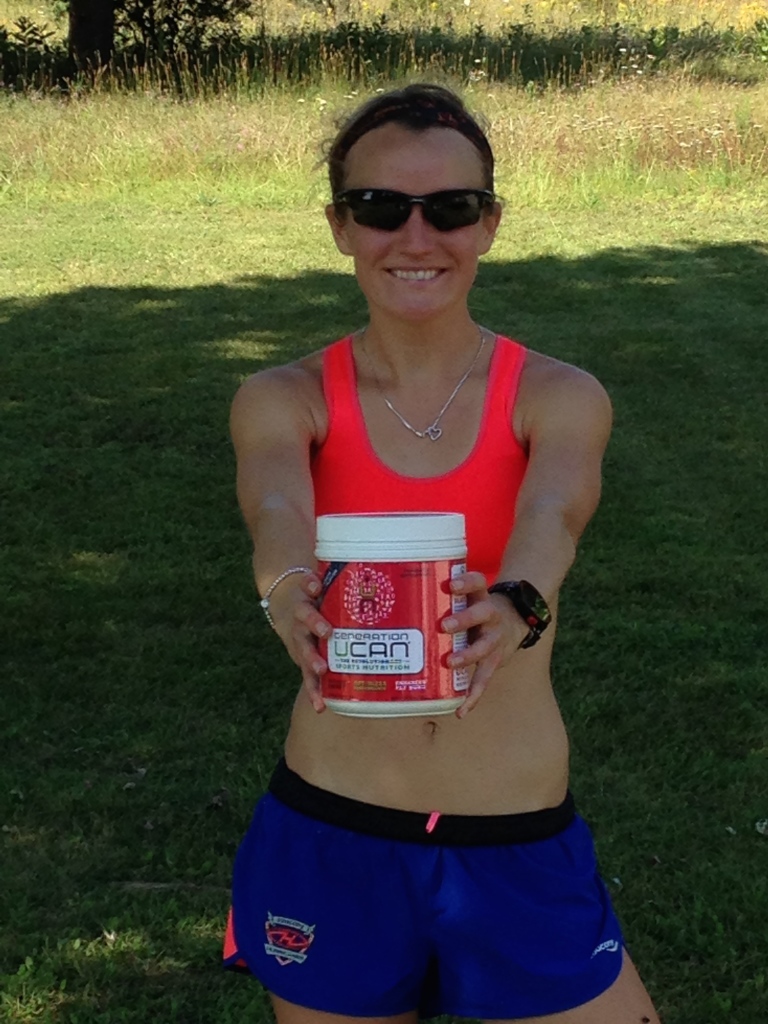 I use Generation UCAN, and it has helped me run my 2:36 marathon with JUST UCAN for fueling. If you use my code RUNNING4REAL you will get 10% off on their website!
I use Generation UCAN, and it has helped me run my 2:36 marathon with JUST UCAN for fueling. If you use my code RUNNING4REAL you will get 10% off on their website!
The researchers also found that up to 83% of marathoners, and 81% of endurance athletes experience some form of GI discomfort during their training or competition.
This to me was a crucial piece of information. I have had many training runs disrupted by this, and shows the importance of the correct fuel to minimize stomach problems.
Should I drink coffee before a run?
A study in the Scientific Journal PLOS One, looked at the effects of coffee versus caffeine in enhancing performance.
The researchers completed an analysis of prior studies to find evidence that caffeine ingested prior to, and during sub maximal and high intensity exercise can substantially improve performance through making the body use fats to fuel the exercise, sparing precious muscle glycogen.
The researchers found no significant difference between using caffeine products and drinking coffee, as both enhanced performance compared to water.
Hooray for coffee drinkers!
I only started drinking coffee towards the end of my running career, but I know this study will make many coffee addicts sigh in relief.
One coffee lover who has had success with caffeine is my friend Esther Erb, who recently won the US Marathon Championships. She explained her coffee trick to us all, which might be helpful.
How much should I eat and drink during my run?
The American College of Sports Medicine recommends consuming 30-60 grams of carbohydrate with water, and 6-12 fluid oz of a sports drink per hour.
This seems like rather a lot, but it is good to show that they recommend consuming carbohydrates, and it would be difficult to overdo it with carbohydrates.
However, one crucial point is that they must be consumed with enough of a gap for your body to digest the sugars between each source.
The minimum time between one carbohydrate source and the next is around 45 minutes as it can take your body up to 30 minutes to use the sugars.
Most athletes found an hour was preferable.
Deciding which carbohydrate source to choose from can be an overwhelming decision.
Even with the results of the study mentioned above, I am still a little skeptical about consuming a true solid like raisins during an endurance event.
I have tried lots of products ion the past, I did have success with gels, and here is my recommendation on how to use those.
In the last few years, as I mentioned earlier, I have been LOVING Generation UCAN, and I used it solely for my recent marathons. I
Based on significant evidence, products with caffeine will have the biggest increase on performance, narrowing down the options slightly.
I wrote a conclusive guide on how to practice fueling for your next marathon in this article.
The longer you are out there running, the closer you should try to be to the recommended amount.
Your body will run out of carbohydrates stores after two to three hours. If you are out there for longer, you definitely need to consume carbohydrates.
It is crucial that you begin early!
Do not wait until you are hungry, or even worse, after you have hit the wall. By that point it is almost too late.
These gels need to be consumed in the presence of water, not energy drinks; time them for locations where there are water stations, or your body will be overloaded with sugar……which could lead to a very unhappy tummy!
Fed up of bombing races?

Many runners (although skeptical at first) have tried my effort scale for racing, and have run HUGE PRs.
You can too with this guide of how to pace yourself...so you speed up, not slow down in the last few miles.
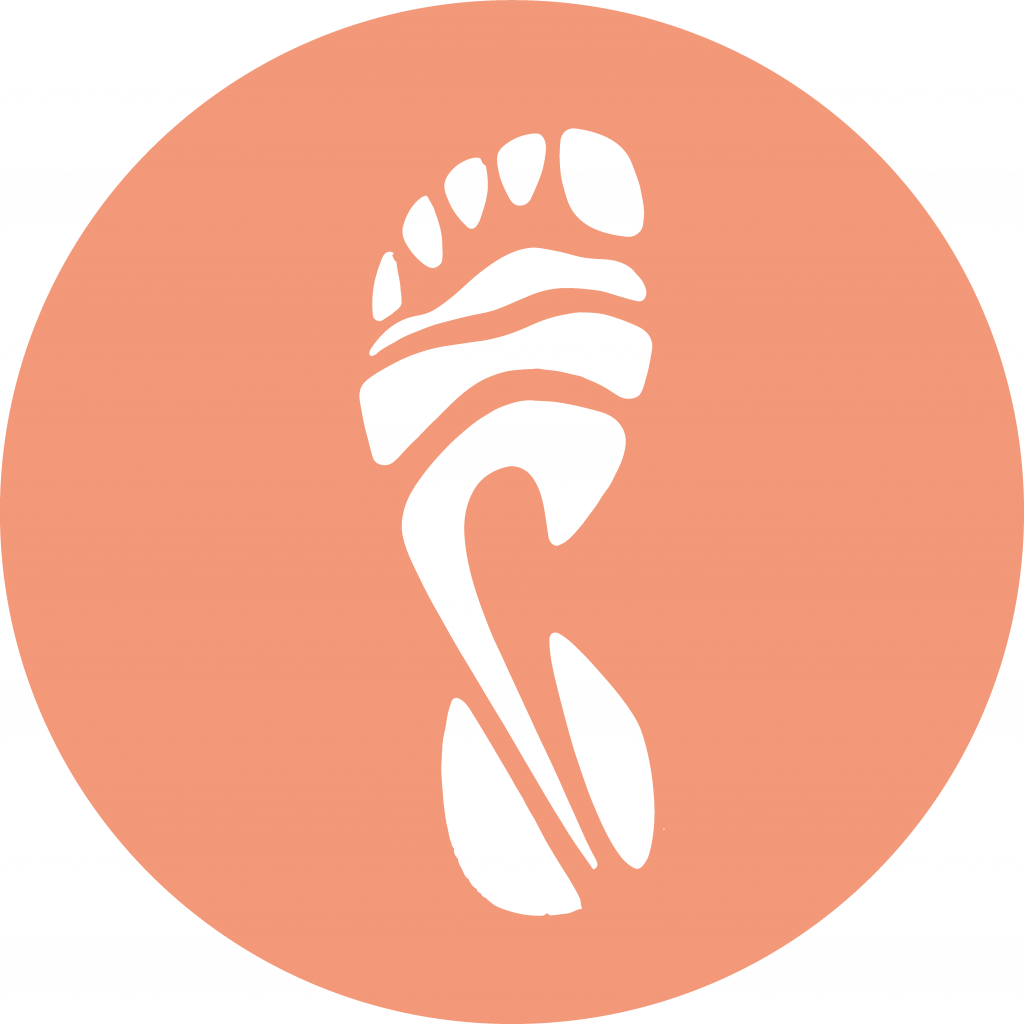
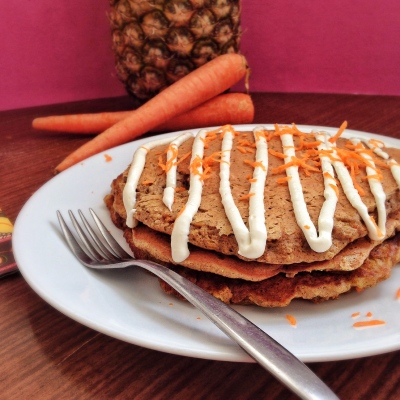
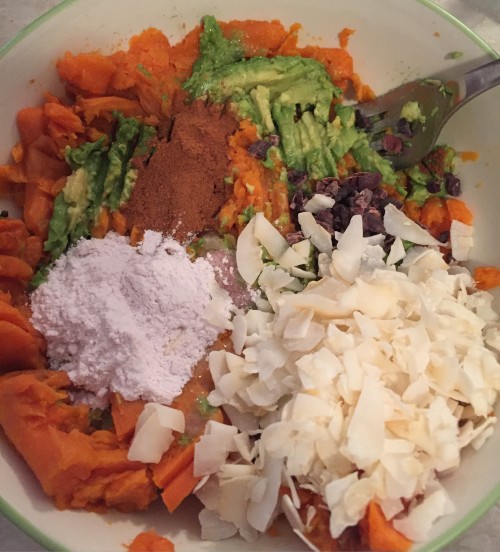
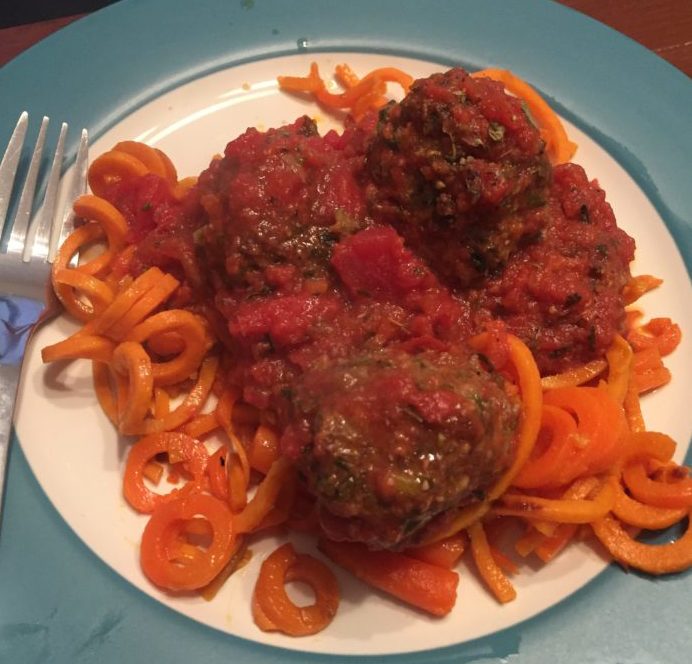
9 Comments.
Hi Tina, I have found your blog on Running Bloggers. This is a very interesting post. Nowadays, I dedicate my life to preventing runners (in the UK) from getting injured and treating them if it is necessary. My blog talks about this stuff and I think that nutrition is really important to prevent and treat injuries, but I have to admit that my knowledge is limited, so I hope to learn from your experience. This is one of my posts in case you would check my blog http://thephysicaltherapy.net/physioblog/2013/10/07/running-injury-prevention-know-your-body-and-limits/ Many thanks. Jorge
HI Tina, I just found your blog and I have found your posts very interesting and helpful. I am running Philadelphia as well.My first marathon! I have been a long distance runner but I have to admit I have not been taking fuels on the run – only water. and i have a banana before. I dont feel like i need it but now im freaking out – perhaps i should regardless of whether i need it or not? I have tried dates last year when i was running to try it, it was fine but this time i did not try… not sure if i should try during this saturdays last “longish” run…any thoughts? Thank you!!
Hello!
Thanks for the lovely comments, I really appreciate it! That is exciting you are also debuting at Philly! I have heard it is a great marathon, a fair course, but lots of fun. I ran the half last year and it was great running through the City 🙂
I am not sure a banana will be enough to get you through the intensity of the day. How far (time/distance) have you gone so far? It is after two hours that your body runs out of muscle glycogen, and by that point the banana is long gone. Do you think you could eat a bagel/toast/oatmeal/animal crackers/dry plain cereal in addition to the banana? I would stick to those as they are plain. Consume them about 3 hours before you run and try it this week for your long run.
As you have not had time to practice, I would try taking a gel this weekend around 45 minutes into your run to see if it upsets your stomach, if it does, then I would stick to sports drinks on the day. I would highly recommend Body Armor as it is natural, so less likely to upset your stomach, but if not then they will hand out gatorade on the course. I would also try taking a gel before you do your last workout, I have been taking a gel right before I start my warm up so that my stomach is used to having it in there when I run hard.
Let me know how you get on this weekend, but do not panic! You will be okay 🙂
Let me know if you have any other questions 🙂
Thank you so much for your feedback!
I have done one 21 and one 20 mile runs and it went fine. Even for 18 miler. My pace is around 7:30 to 8 min/mile. I was thinking about trying Peanut butter with Banana in the morning but i will try your suggestions…and then having something midrun something like gel or maybe something more natural.
I really want to do well in the race and i dont want it to go back because of the nutritional part.
Thank you once again! Hope to meet you in person 🙂
Very interesting Tina, you might even inspire me to start running again!
WOW! That would be an impressive feat 🙂 You should check out my latest post….it is right up your alley 🙂
I tried posting a message but it did not go through for some reason. Anyways, I wanted to let you know that I had a bigger prerun snack as well as a gel during my last longish run today and it went fine. I feel less anxious about the nutrition aspect now! Thank you, Tina!
Oh thats strange. If you have any other questions, you can email me at tinamuir88@gmail.com 🙂
I am glad it worked out for you! It should be fine on raceday, just make sure you drink it with water! Maybe will see you there!
This is so true/good advice. I used to think I could get by with the stuff on the course – gatorade here and there an a gel at 30km mark. What was I thinking? I have recently discovered that I am one of those people that can eat anything and still run. So I go big in the morning ( 2hours before the race I eat oatmeal, blueberries and greek yogurt). Closer to the race I try to eat a banana. Then I start taking a gel (GU gels) about every 30 minutes. Seriously. I run so much better. Now my biggest problem is just trying to find a way to carry everything (thank god for sports bars and vaseline).
I read in another post of yours that you drink water and an electrolyte drink before a race. I wish I could figure that out. I can’t drink much of anything in the morning…otherwise I am stopping at every port-a-potty to pee. I have my coffee and a few sips of water after breakfast. But that is it. I don’t know how you do it!